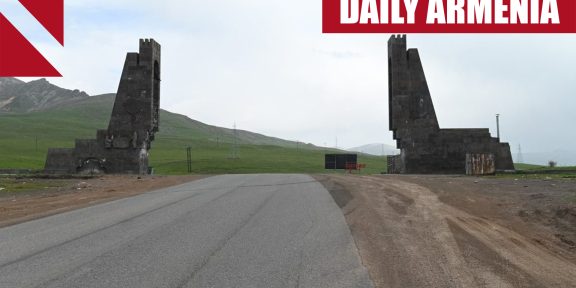By Mark Dovich
Recently released data from the Caucasus Barometer, an annual household survey and the largest coordinated data collection effort in the South Caucasus, highlight widespread public uncertainty in Armenia and Georgia about the region’s geopolitical path. The surveys, organized by the Caucasus Research Resource Centers think tank network, were conducted in Armenia from February 21 to March 15, 2020 and in Georgia from October 9 to November 4, 2019.
Dissolution of the USSR
When asked if the Soviet Union’s dissolution “had been a good or bad thing” for their respective countries, respondents in both Armenia and Georgia were nearly evenly split. In Armenia, 45 percent of respondents said it had been “a good thing,” 40 percent said it had been “a bad thing,” and 15 percent either answered “do not know” or refused to answer altogether. Meanwhile, among Georgians, 41 percent said it had been “a good thing,” 42 percent said it had been “a bad thing,” and 17 percent either answered “do not know” or refused to answer.
Interestingly, Armenian and Georgian respondents were much more decisive when asked to justify their decision to call the Soviet Union’s dissolution “good” or “bad”—and gave overwhelmingly similar answers. Of those respondents who viewed the Soviet Union’s collapse positively, upwards of 80 percent in both countries said that the “dissolution of the USSR was a good thing because” Armenia and Georgia “became independent,” with no other answer mentioned by more than 10 percent of respondents. Likewise, of those respondents who viewed the Soviet Union’s collapse negatively, 80 percent in Armenia and 64 percent in Georgia said that the “dissolution of the USSR was a bad thing because people’s economic situation has worsened.”

Main Friends and Enemies
Respondents in Armenia and Georgia were asked to name their respective countries’ “main friend” and “main enemy” on the international stage. In the “main friend” question, respondents expressed fairly uncertain views. In fact, the answer “no one” was among the top responses for both groups. In Armenia, the top two answers were Russia, at 57 percent, and “no one,” at 17 percent. In Georgia, the top three answers were “no one,” at 26 percent, “do not know” or “refuse to answer,” at 21 percent, and the US, also at 21 percent.
Although the majority of respondents naming Russia as Armenia’s “main friend” may appear rather decisive, it represents a massive decline from 2013, when 83 percent of respondents identified Russia as Armenia’s “main friend.”
In contrast, the “main enemy” question prompted slightly more decisive opinions, particularly among Armenian respondents. When asked to name Armenia’s “main enemy,” respondents overwhelmingly answered Azerbaijan, at 75 percent, and Turkey, at 22 percent. Meanwhile, Georgian respondents answered Russia, at 49 percent, and “do not know” or “refuse to answer,” at 31 percent.

Key International Organizations
Finally, respondents were questioned on their perceptions of two key international organizations, the EU and NATO. While neither Armenia nor Georgia are member states of either organization, the Georgian government has openly pressed for EU and NATO membership for quite some time, while Armenia maintains a close security and economic relationship with Russia through its membership in the Collective Security Treaty Organization and the Eurasian Economic Union.
Armenian and Georgian respondents alike expressed ambivalent views toward these organizations—despite their governments’ diverging positions on the matter. In fact, roughly one in four respondents in both countries reported ambivalent views on Euro-Atlantic integration, although the Georgian respondents exhibited more positive attitudes than their Armenian counterparts, who, in turn, more frequently answered “do not know” or refused to answer altogether.
When asked if they would support their country joining the EU, 11 percent of Armenian respondents said they would not support it, 24 percent said they would “partially support, partially not support” it, 40 percent said they would support it, and 24 percent either answered “do not know” or refused to answer. At the same time, 9 percent of Georgian respondents said they would not support their country joining the EU, 25 percent said they would “partially support, partially not support” it, 52 percent said they would support it, and 13 percent either answered “do not know” or refused to answer.
Meanwhile, 18 percent of respondents in Armenia said they would not support their country joining NATO, 24 percent said they would “partially support, partially not support” it, 25 percent said they would support it, and 33 percent either answered “do not know” or refused to answer. On the other hand, 14 percent of respondents in Georgia said they would not support their country joining NATO, 23 percent said they would “partially support, partially not support” it, 50 percent said they would support it, and 13 percent either answered “do not know” or refused to answer.


Navigating International Relations in a Complicated Region
The survey results detailed above show deep ambivalence among the Armenian and Georgian general publics about the Soviet Union’s legacy in the region, the best geopolitical path forward for the region, and the state of the region’s relations with key external players—a reflection of the difficult geopolitical position of the South Caucasus, which has been a crossroads of cultures and civilizations for centuries.
Today, Armenia, Azerbaijan, and Georgia face the unenviable reality of navigating complex geopolitics both within the region and in their relations with the three much larger and more powerful countries that surround them—Iran to the south, Russia to the north, and Turkey to the west. Add the ongoing conflicts in Abkhazia, Nagorno-Karabakh, and South Ossetia, high levels of engagement by the US and EU, and increasing interest from China, and it becomes even clearer that the region’s geopolitical position will remain complicated for some time.
















